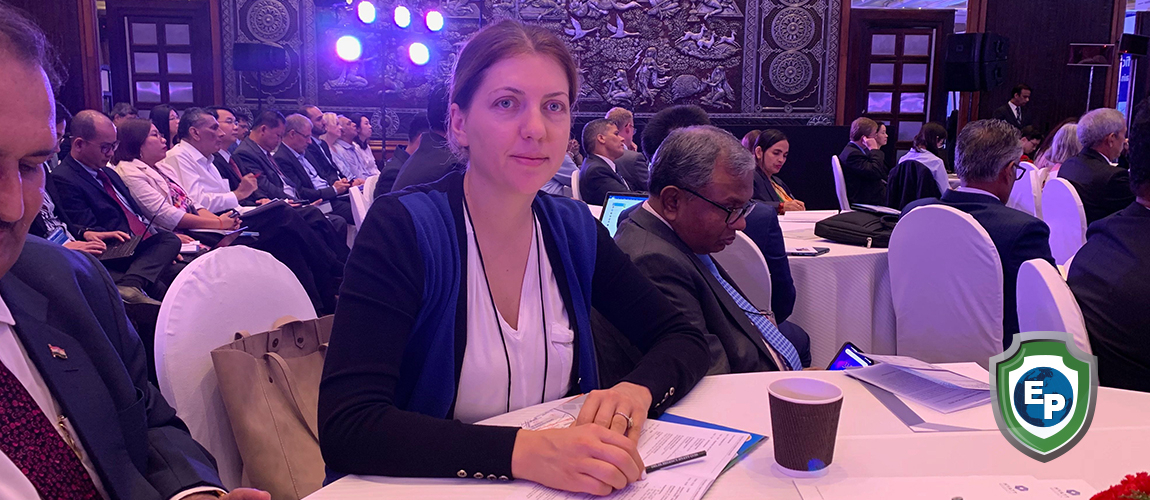Day One at the Asia-Pacific Trade Facilitation Forum
Export Portal CEO Ally Spinu is attending the APTFF, speaking on the importance of trade facilitation for mSMEs all over the world. Read this article to learn about what was discussed on the first day of this forum!

The Asia-Pacific Trade Facilitation Forum (APTFF) began on 17 September with a note from the Ministry of Commerce and Industry in India. This is India’s first year hosting this event, due to in part the current government’s actions towards trade facilitation.
The minister of the Ministry of Commerce and Industry in India, Mr. Piyush Goyal, opened the forum stating that “together, we build success.” The minister was referencing the unification of the Asia-Pacific region for a tariff-free and barrier-free trade. The following trade agreements were actively discussed:
- ASEAN – the Association of Southeast Asian Nations is a regional intergovernmental organization comprising ten countries in Southeast Asia, which promotes intergovernmental cooperation and facilitates economic, political, security, military, educational, and sociocultural integration among its members and other countries in Asia. The nations included are Singapore, Brunei, Malaysia, Thailand, Philippines, Indonesia, Vietnam, Laos, Cambodia, and Myanmar.
- SASEC – The South Asia Subregional Economic Cooperation (SASEC) Program, set up in 2001, brings together Bangladesh, Bhutan, India, Maldives, Myanmar, Nepal, and Sri Lanka in a project-based partnership to promote regional prosperity by improving cross-border connectivity, boosting trade among member countries, and strengthening regional economic cooperation.
- CPTPP – The Comprehensive and Progressive Agreement for Trans-Pacific Partnership (CPTPP), also known as TPP11 or TPP-11, is a trade agreement between Australia, Brunei, Canada, Chile, Japan, Malaysia, Mexico, New Zealand, Peru, Singapore, and Vietnam.
Leaving No One Behind in Trade Facilitation: Identifying Challenges, Priorities, and Solutions
In this high-level panel discussion, Mr. Ali Ahmed, the CEO of Bangladesh Foreign Trade Institute, said that “despite the government’s efforts to digitize the trade process, the majority of the stakeholders remain behind, due to the lack of knowledge or education or lack of technology.” This statement is something all policymakers and the world must keep in mind when looking to better facilitate trade.
Platforms like Export Portal are already putting this into practice, bridging the gap between the support current policy can provide mSMEs and what is needed to trade securely and successfully. Its comprehensive trade platform gives mSMEs and other stakeholders the tools they need to meet the digitalization process with more ease.
Digital and Sustainable Trade Facilitation in Asia and the Pacific
In this session, Yann Duval explained sustainability from the point of view of United Nations Economic and Social Commission for Asia and the Pacific (ESCAP).
“Sustainability has 3 main pillars: social, economic, and environmental,” Duval said. “Trade facilitation plays a key role in all 3 pillars.”
In the same session, Poul Hansen, the Chief of Trade Facilitation section of the United Nations Conference on Trade and Development (UNCTAD), discussed the importance of strengthening the communication between public and private sectors, as well as the importance of eCommerce in trade.
An average of 97% of worldwide trade originate through eCommerce; therefore, no policymaker should ignore the enormous role of platforms such as Export Portal in the process of trade facilitation.
Mongolian Deputy Director General of Department of Foreign Trade and Economic Cooperation Mrs. Battsetseg Tuvshintugs spoke on how trade facilitation can fall apart in practice. Mongolia relies on Russia and China mainly for transit of their goods. Despite the fact that these three countries have agreements to facilitate smooth trade, on the smaller or local government level, these rules are not respected and are largely violated. This creates bottlenecks for smaller exporters and can be disastrous and very expensive for stakeholders that do not have the capital to support delays.
This statement was met with loud applause for Mrs. Tuvshintugs addressing this. The ongoing issue of corruption and bureaucracy prevents mSMEs from growing and expanding like they should.

Export Portal at APTFF
Ally Spinu, CEO of Export Portal, is attending the APTFF to speak at the Digital and Sustainable Trade Facilitation for Regional Prosperity session on 18 September at 9:00 AM.
Export Portal’s trade goals align directly with the purpose of this session, as its international B2B trade platform is an affordable and all-encompassing solution for SMEs all over the world. The features that are available and being developed on Export Portal, such as the panel of experts (EP+), the educational hub (EPU), and data flow insights (EPI), provide SMEs with the resources they need to trade effectively on an international scale safely, securely, and efficiently.
Learn more about what Export Portal has to offer and register today to join the international trade revolution.






Comments 0